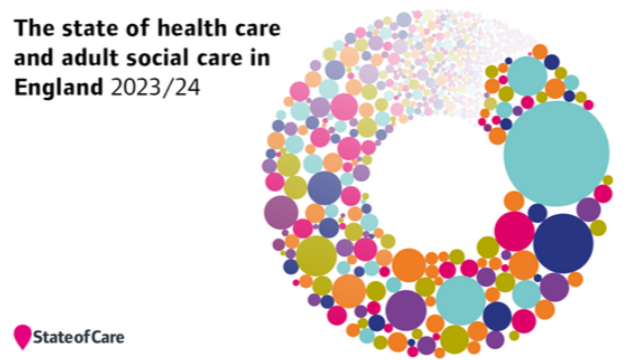State of Care 2023/24

“This year’s State of Care highlights ongoing issues with both access to and quality of care, along with the impact on those who rely on health and social care services. It’s particularly concerning how many children and young people aren’t getting the timely care they need. The health and wellbeing of our young people is often seen as a key indicator of a nation’s future prospects; if we don’t ensure safe and effective care for our children today, we risk failing their future too.” — Ian Dilks, Chair, CQC Primary and Community Care Access to GPs continues to be a struggle, with more people now registered. From March 2020 to March 2024, the number of registered patients in England rose from 60 to 63 million. Pressure on NHS dental services is also impacting access and contributing to worsening oral health, particularly for children in deprived areas, where rates of tooth decay are over twice those in more affluent regions. [Read more] – The state of health care and adult social care in England 2023/24 – Care Quality Commission Adult Social Care Demand for social care remains high, especially for patients needing support after hospital discharge. However, the supply often falls short, causing delays in finding care home placements or home-based care—these waits account for 45% of delayed hospital discharges of over two weeks, impacting nearly 4,000 people daily. Staff shortages have eased, with vacancies at a three-year low, though international recruitment appears to be plateauing, and fewer overseas workers are applying for health and care worker visas. Despite these challenges, some exceptional adult social care providers continue to place people at the centre of their services. [Read more] – The state of health care and adult social care in England 2023/24 – Care Quality Commission Mental Health The demand for mental health services keeps growing, especially among children. Access remains a challenge, particularly for people in deprived areas, women, and ethnic minorities, who are more likely to seek emergency or urgent care. Waiting times for community-based treatment can stretch into months, and in some cases, years. Although the mental health workforce has expanded, staffing and skill shortages continue to affect care quality, with safety on mental health wards a persistent concern due to outdated facilities and limited resources. [Read more] – The state of health care and adult social care in England 2023/24 – Care Quality Commission Secondary Care High demand and ongoing pressures in secondary care mean that many people, including children, aren’t receiving timely support, leading to worsening health issues that require more intensive treatments and prolonged hospital stays. Service performance often falls short of expected standards, and long waits for diagnostics, including cancer screenings, remain a significant concern. [Read more] – The state of health care and adult social care in England 2023/24 – Care Quality Commission Deprivation of Liberty Safeguards (DoLS) Wait times for Deprivation of Liberty Safeguards (DoLS) remain too long, despite efforts by local authorities to manage backlogs. The need for a more sustainable improvement is clear, as delays leave vulnerable individuals without proper legal protection. [Read more] – The state of health care and adult social care in England 2023/24 – Care Quality Commission Other Key Challenges Integrated Care and System Pressures Finance, planning, and workforce shortages are pressing concerns for integrated care boards as people face difficulties accessing services. Overstretched urgent and emergency care is a symptom of broader system issues. Addressing health and care inequalities remains a key focus for integrated care systems (ICSs), though competing priorities, financial strain, and gaps in data analysis and accountability pose obstacles. Although ICS assessments by CQC are currently paused, efforts continue to understand community needs, from children’s dental health to older adults with dementia. Carer Support Carers play a crucial role in supporting millions, yet more needs to be done to identify them and make them aware of their rights to assessments and services. Local councils have taken steps to reduce inequality and better understand their communities, but stronger connections with the voluntary sector and community groups are needed. Areas of Concern Key issues flagged in this year’s report include safety, quality, staffing, and inequality challenges: Many women still lack access to the maternity care they need. Children and young people face delays in accessing vital services. Health visitor numbers have dropped by 45% over the past nine years. Only about a quarter of people with learning disabilities are registered. The average wait time for autism assessments is close to a year, far exceeding the three-month target. Black and Black British people are over three and a half times more likely to be detained under the Mental Health Act than white individuals. [Read more] – The state of health care and adult social care in England 2023/24 – Care Quality Commission



